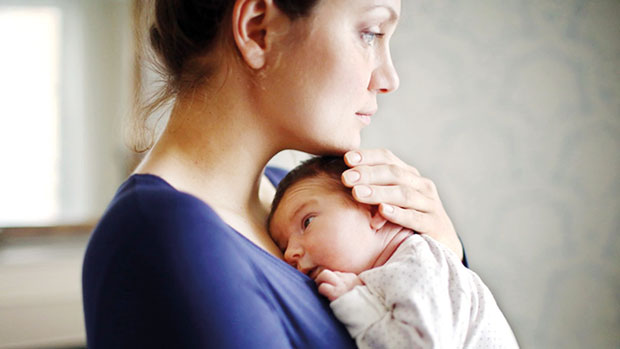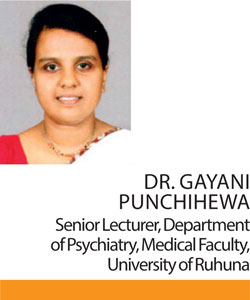03 Nov 2017 - {{hitsCtrl.values.hits}}

 There is a huge stigma associated with the topics related to mental illnesses in Sri Lanka. One of these mental illnesses is Postpartum Depression. Patients don’t recognize treatment for Postpartum Depression as important. This can negatively impact the health of both the mother and the baby.
There is a huge stigma associated with the topics related to mental illnesses in Sri Lanka. One of these mental illnesses is Postpartum Depression. Patients don’t recognize treatment for Postpartum Depression as important. This can negatively impact the health of both the mother and the baby.
Speaking to the Health Capsule Dr. Gayani Punchihewa, Senior Lecturer, Department of Psychiatry, Medical Faculty, University of Ruhuna, explained the causes, signs and symptoms, treatment and the screening tests that are available in Sri Lanka connected to Postpartum Depression.
Definition
Explaining what Postpartum Depression is Dr. Punchihewa said, “Postpartum Depression (PPD) or Postnatal Depression is a psychiatric illness that occurs after the delivery of a child. It is recognized as a unique entity in psychiatry because associated factors and the circumstances under which it occurs are different. After the pregnancy, the physiology of the woman’s body is different as there are hormonal and emotional changes.10 to 15% of mothers would develop PPD. But it usually goes undetected and therefore remains without being diagnosed. It is a principal condition which can be cured. The most important thing is that a mother needs to be both physically and mentally healthy for the newborn’s development. If the mother is depressed it will affect the mother -baby bonding, which is of utmost importance in the cognitive development of the baby,”Dr. Punchihewa said.
Causes 
Dr. Punchihewa stated that the genetic factor is one of the causes adding, “It has genetic contributions. If the mother has a family history of psychiatric illness, there is a genetic predisposition,” she said.
Dr. Punchihewa further said,“With the changes that occur in the mother’s body following delivery, the hormonal, neurochemical and emotional changes make the mother more vulnerable to develop PPD. There are new responsibilities and she has to maintain family relationships. It is also physically exhausting especially if the mother has experienced difficulties during labour. So all these changes contribute to PPD. The risk factors regarding the development of PPD are past history of psychiatric illness, stress during pregnancy, domestic violence, poor family support, social issues etc.,”she explained.
Signs and symptoms
Speaking of the signs and symptoms, Dr. Punchihewa said, “It doesn’t happen soon after delivery. Generally the signs and symptoms will appear three to four weeks after the delivery. The mother would feel tired, not interested in attending to the baby, her sleep will be disturbed, appetite will be low, she will be thoughtful, withdrawn, irritable and weepy. These are the normal symptoms of depression. But for a postpartum mother there are some other specific symptoms that will be exhibited which revolve around the baby and the family. In our community what we normally see is that they feel that they are inadequate as mothers. They have difficulties in breastfeeding. Most of the mothers visit pediatricians complaining that they don’t have enough breast milk and that the baby is not putting on weight,” the doctor said.
She further explained that when it gets worse the patient would start having hallucinations and delusions.
“They can experience hallucinations and start hearing things when nobody is around; such as people talking to her. Common phrases they hear are: ‘you are a bad mother’ or ‘you are not playing the proper role of a mother’. And then the delusions are that they develop abnormal beliefs concerning the baby or the other family members. This is not common and happens when the depression is severe and left untreated,” she said.
She further said, “The highest risk is suicidal thoughts. It is so important to recognize this condition. when you see the news we hear of how mothers jump into rivers and take their lives, often along with the baby. These incidents are reported and the message given is that these incidents happen due to relationship issues with the husband and the in-laws, but the underlying cause (PPD) has been untreated,”she explained.
Treatment
Speaking of the treatment that’s administered, Dr. Punchihewa said that it depends on whether the depression is mild, moderate or severe.“If it is mild, cognitive behavioural therapy, a form of psychological treatment, which would suffice. But if it is moderate or severe you need to specify medication so that pharmacological treatment is done and anti depressants are given. Medications that do not harm the baby are given, because the medication can enter the blood stream and go to the baby through breast milk. There are medicines which have minimum side effects on the baby,” she explained.
She further said,“When you start treatment you won’t get cured immediately. It takes time to be cured. Even after you feel better you are not supposed to stop the medication. You continue with it for about six months and then you gradually tail off the medication. It might take 6 to 9 months of treatment and you should follow the psychiatrist’s advice,”she affirmed.
Dr. Punchihewa further said that there is another type of treatment for severe depression, especially regarding mothers who are having suicidal thoughts. “The recommended treatment is electro convulsive therapy or what is called shock treatment. That acts faster, because medication takes time to act and patients who are having suicidal thoughts need to be treated aggressively. Many people have the wrong notions about electro convulsive therapy, but it is effective and a well tested method of treatment,”Dr. Punchihewa said.
Difference between Postpartum Blues and Postpartum Depression
Dr. Punchihewa said, “Postpartum blues is also known as maternity blues. It is a mild condition which resolves spontaneously. It lasts for about a week or two. The mother will be crying, will have a loss of appetite, find it difficult to cope and adjust to the new situation. But it will not last long. So the mother needs a lot of support from the family, the partner and the health care team. With support they can return to normalcy. It is a milder form of psychiatric condition and can be controlled with support and acceptance that she is getting adjusted to the new situation. It doesn’t call for the use of medications. Around 30 to 80% of mothers can get maternity blues. But there is a risk of a mother who has developed maternity blues developing PPD later on,”she said.
Men
Dr. Punchihewa further said that it is also recognized that men too can develop PPD, with the changes that occur in the responsibilities and the relationships. “In other countries Governments authorize paternity leave after the baby is born and even in Sri Lanka now the fathers are entitled to paternity leave. But in our society leave for the father has not been recognized. Although this condition is present, we have not encountered fathers with PPD,” she said.
Screening test
Dr. Punchihewa stated that since the problem associated with PPD goes without being diagnosed and is unrecognized, they have now introduced a screening tool to the antenatal records in the primary health care system. “The Edinburgh Postnatal Depression Scale has been included as a screening tool. This was introduced in our country around three or four years ago.
A questionnaire is given to the postpartum mothers in their third or fourth week by the midwife and they are supposed to fill it. There is a marking system involved. The total is 30 marks. If any mother gets 9 or more than 9 marks that mother needs to be referred to a psychiatrist. That doesn’t mean that she has depression, but there is risk of developing depression. The condition of such mothers needs to be fully assessed by a psychiatrist. We need to raise awareness regarding the use of this screening tool as some mothers are reluctant to use it. They don’t recognize it as something of importance and don’t fill it. A difficulty we encounter is that when they are referred to the psychiatrist, they stay away due to the stigma associated with such mental conditions. It is important that they at least see a general practitioner to get themselves assessed,” she concluded.
23 Dec 2024 2 hours ago
23 Dec 2024 3 hours ago
23 Dec 2024 3 hours ago
23 Dec 2024 4 hours ago
23 Dec 2024 5 hours ago